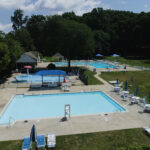Pain Is the Essence of Swimming
The ocean water in Kiawah, South Carolina yesterday was as warm and soft as a kitten’s stomach. On a lime green toy noodle, I floated around in this delicious drink, not really feeling the desire to get out. No sense ending a soothing feeling. The waves occasionally splashed on my face, and I avoided touching the bottom out of concern of what creature might be down there waiting to chomp on my feet.
This is my summer family vacation spot this year. It reminds me of about a year ago when we did our vacation at another beach resort during the time of the 2016 Summer Olympics when all the spectacular swimming races held us in suspense day after day, night after night.
I miss the Olympic swimming events and can’t wait for the 2020 Games in Japan when we get to enjoy those races one more time. I am not even a big swimmer but have always been a big swimming fan.
My interest is rooted in my experience at 12 years old swimming the 100-meter individual medley. Not being in great swimming shape, I recall that feeling at the end of the butterfly, the first length of the race’s four.
As I hurled my arms towards the wall, I was exhausted and felt as if I had swum more than one complete race already. This was plenty for me. But as my hands touched the wall the disturbing thought entered my mind that I had to swim as fast as I could for three more laps. Only one-fourth of the way through, I felt as if I had exerted enough energy for a full race and, had people not been watching, I might have just stopped right there.
But I couldn’t quit, not in front of everyone including my friends and coaches. I had to keep swimming no matter how much heavy breathing I was already doing and regardless of how to soar my arms, shoulders, and legs already were.
I started the backstroke. It hurt. But at least I could breathe without putting my head under water. I stared at the sky and kicked while moving my arms around in a circular pattern above my head. Man the pain was something I will never forget. Tiring. So tiring. And it took less than a minute to feel this way. And I couldn’t quit even though I wanted to. It would have been too embarrassing.
At the end of the backstroke I was on the side of the pool where the race would end but, unfortunately, I wasn’t nearly done. I had to push off the wall and start the breaststroke. By this stage of the race, I was not concerned with who was ahead or behind me. All I could think about was finishing the race so the pain would stop.
This is what made this race different from, say, the 50-meter freestyle. During the latter event, I could see where I stood versus competitors and go faster or slower and have some ability to control how I swam the race. During the IM there was none of that. It was all about just grinding out the strokes and trying to complete all the madness and get to the wall without quitting.
The pain of that IM event, which I swam several times, has stayed with me to this day. I wondered how people would swim it and gut through the pain and do it quickly. This took mental toughness that, frankly, I was never able to draw upon. The race was pure pain from start to finish. I recall after Michael Phelps won the Gold Medal in the 400 IM in Beijing, he said it was the most pain he had ever felt and he would never do the race again in a competitive meet. Even for the incomparable Phelps, the IM was a tough test of physical and mental endurance.
It’s the pain and pain tolerance that fascinates me so much about swimming. How does a swimmer fight through the pain they feel when swimming and continue to swim fast anyway?
When I watch the swimmers in the Olympics, I wonder how each one of them deals with the suffering. You can’t hear them suffering because their heads are underwater and they may not verbalize to people afterward how much the race hurt them. But in most cases, they hurt during those races. It’s a quiet pain, but it’s so real and acute.
Those who qualify for the Olympics do so because of their exceptional natural talent but also because during practices they have had the toughness to tolerate more pain for more time than others who didn’t make the team. They got to the big stage by, in many cases, enduring more pain than others more often.
This is something to be revered. This is something to be respected. This is something to be anticipated.
Author Profile

-
Sammy Sportface, a sports blogger, galvanizes, inspires, and amuses The Baby Boomer Brotherhood. And you can learn about his vision and join this group's Facebook page here:
Sammy Sportface Has a Vision -- Check It Out
Sammy Sportface -- The Baby Boomer Brotherhood Blog -- Facebook Page
Latest entries
 BonusApril 15, 2024Dancing in the Meadowlands – Then Darting Away
BonusApril 15, 2024Dancing in the Meadowlands – Then Darting Away BonusApril 13, 2024Back in Bernardsville: You Can Go Home Again
BonusApril 13, 2024Back in Bernardsville: You Can Go Home Again BonusApril 12, 2024Jersey – His Hometown From A Lifetime Ago
BonusApril 12, 2024Jersey – His Hometown From A Lifetime Ago BonusApril 10, 2024Sportface Whizzing Up Freeway to Gotham City
BonusApril 10, 2024Sportface Whizzing Up Freeway to Gotham City

